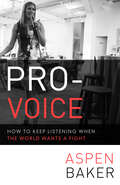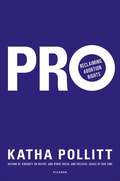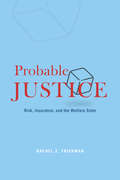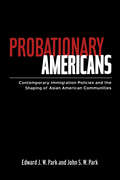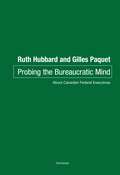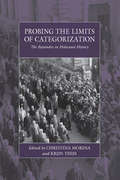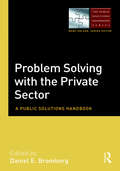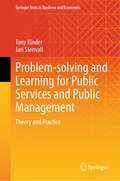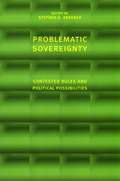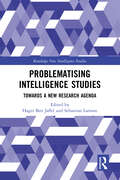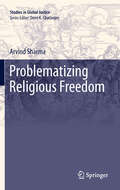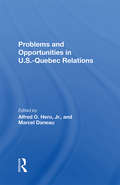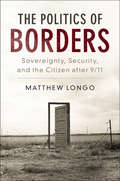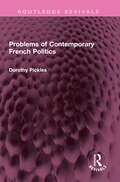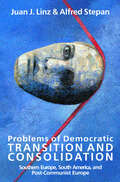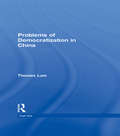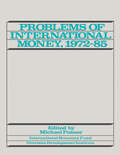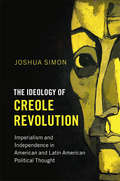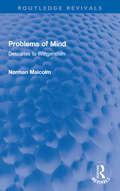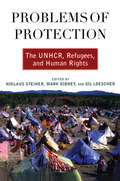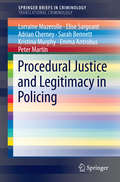- Table View
- List View
Pro-Voice: How to Keep Listening When the World Wants a Fight
by Aspen BakerDialogue, Not DogmaWhen Aspen Baker had an abortion at the age of twenty-four, she felt caught between the warring pro-life and pro-choice factions, with no safe space to share her feelings. In this hopeful and moving book, Baker describes how she and Exhale, the organization she cofounded, developed their “pro-voice” philosophy and the creative approaches they employed to help women and men have respectful, compassionate exchanges about even this most controversial of topics. She shows how pro-voice can be adopted by anyone interested in replacing ideological gridlock with empathetic conversation. Peace, in this perspective, isn't a world without conflict but one where conflict can be engaged in—fiercely and directly—without dehumanizing ourselves or our opponents.
Pro: Reclaiming Abortion Rights
by Katha PollittA powerful argument for abortion as a moral right and social good by a noted feminist and longtime columnist for the nation. Forty years after the landmark Roe v. Wade ruling, "abortion" is still a word that is said with outright hostility by many, despite the fact that one in three American women will have terminated at least one pregnancy by menopause. Even those who support a woman's right to an abortion often qualify their support by saying abortion is a "bad thing," an "agonizing decision," making the medical procedure so remote and radioactive that it takes it out of the world of the everyday, turning an act that is normal and necessary into something shameful and secretive. Meanwhile, with each passing day, the rights upheld by the Supreme Court are being systematically eroded by state laws designed to end abortion outright. In this urgent, controversial book, Katha Pollitt reframes abortion as a common part of a woman's reproductive life, one that should be accepted as a moral right with positive social implications. In Pro, Pollitt takes on the personhood argument, reaffirms the priority of a woman's life and health, and discusses why terminating a pregnancy can be a force for good for women, families, and society. It is time, Pollitt argues, that we reclaim the lives and the rights of women and mothers.
Proactive Police Management
by Edward A. Thibault Lawrence M. Lynch R. Bruce McbridePolice managers anticipating events through planning, using police personnel and resources effectively.
Probable Justice: Risk, Insurance, and the Welfare State
by Rachel Z. FriedmanDecades into its existence as a foundational aspect of modern political and economic life, the welfare state has become a political cudgel, used to assign blame for ballooning national debt and tout the need for personal responsibility. At the same time, it affects nearly every citizen and permeates daily life—in the form of pension, disability, and unemployment benefits, healthcare and parental leave policies, and more. At the core of that disjunction is the question of how we as a society decide who should get what benefits—and how much we are willing to pay to do so. Probable Justice traces a history of social insurance from the eighteenth century to today, from the earliest ideas of social accountability through the advanced welfare state of collective responsibility and risk. At the heart of Rachel Z. Friedman’s investigation is a study of how probability theory allows social insurance systems to flexibly measure risk and distribute coverage. The political genius of social insurance, Friedman shows, is that it allows for various accommodations of needs, risks, financing, and political aims—and thereby promotes security and fairness for citizens of liberal democracies.
Probationary Americans: Contemporary Immigration Policies and the Shaping of Asian American Communities
by John Sw Park Edward Jw ParkProbationary Americans examines contemporary immigration rules and how they affect the make-up of immigrant communities. The authors' key argument is that immigration policies place race and class as important criteria for gaining entry to the United States, and in doing so, alter the makeup of America's immigrant communities.
Probing the Bureaucratic Mind: About Canadian Federal Executives
by Gilles Paquet Ruth HubbardThis book explores the thinking of Canadian federal public service senior executives through conversations. The transformation of the environment and of the institutional order has created quite a challenge: maintaining some sort of adequacy between these evolving realities and the frames of reference in use by public sector executives. Complexity is often nothing more than a name for a new order calling for a new frame of reference, and the reluctance to abandon old conceptual frameworks is often responsible for fundamental learning disabilities. Through a series of conversations with Canadian federal senior executives about more and more daunting problems - from coping with an evolving context, to engaging intelligently with a new modus operandi, to trying to nudge and tweak programs in order to correct toxic pathologies, to reframing perceptions and redesigning organizations to meet the new challenges—weaknesses of the capabilities of the Canadian federal executives to respond to current challenges were revealed, and suggestions made about ways to kick start a process of refurbishment of these capabilities.
Probing the Limits of Categorization: The Bystander in Holocaust History (War and Genocide #27)
by Christina Morina Krijn ThijsOf the three categories that Raul Hilberg developed in his analysis of the Holocaust—perpetrators, victims, and bystanders—it is the last that is the broadest and most difficult to pinpoint. Described by Hilberg as those who were “once a part of this history,” bystanders present unique challenges for those seeking to understand the decisions, attitudes, and self-understanding of historical actors who were neither obviously the instigators nor the targets of Nazi crimes. Combining historiographical, conceptual, and empirical perspectives on the bystander, the case studies in this book provide powerful insights into the complex social processes that accompany state-sponsored genocidal violence.
Problem Solving with the Private Sector: A Public Solutions Handbook (The Public Solutions Handbook Series)
by Daniel E. BrombergProblem Solving with the Private Sector presents advice and solutions for fruitful government–business alliances from the perspective of everyday public management. With a focus on job training, economic development, regulation, and finance and innovation, each chapter discusses a traditional tool of government presented in a practical and applied manner, as well as the implementation of the tool with clear examples. Content-rich case studies on a wide range of policy issues, including regulatory policy, natural resources, manufacturing, financial services, and health care highlight opportunities for government and business to collaborate to pursue the public good. This book offers current and future public managers possible solutions to complex problems for effective government–business alliances in a range of settings. It is essential reading for all those studying public management, public administration, and public policy.
Problem-solving and Learning for Public Services and Public Management: Theory and Practice (Springer Texts in Business and Economics)
by Jari Stenvall Tony KinderIn this textbook readers will acquire knowledge of problem-solving and learning to enhance both efficiency and the experience of service users in rapidly changing service environments, that can create new service models. Emphasizing that, above all else, individuals are at the centre of services, the book goes deeply into the nature of public services and their logic-of-practice. By applying learning and problem-solving approaches, the reader gains practical capabilities in addition to an appreciation of the latest research literature. Following a multidisciplinary, international approach, the book suggests a new typology of problem-framing and presents many examples of how new service solutions can be created in any public service context. The book offers a conceptual toolkit to understand and analyse dynamically changing services and the application of new technologies. Topics covered include pressing issues surrounding public services, such as e-technology, digitalisation, e-services, artificial intelligence, entrepreneurialism, sustainability, climate, inequality, developing economies, and smart cities. Chapters follow a similar structure: issue, problems, what we know, learning framework, worked example, theory and practice conclusions, as well as teacher and learner notes. Addressing advanced undergraduate and graduate students of public administration, public management, political science, sociology, computer science, and information systems, the book will also be a valuable resource for practitioners, i.e. experts and managers in public organizations, professionals in organizations working at the business and public sectors, consultants, and IT suppliers.
Problematic Sovereignty: Contested Rules and Political Possibilities
by Stephen KrasnerSome of the most pressing issues in the contemporary international order revolve around a frequently invoked but highly contested concept: sovereignty. To what extent does the concept of sovereignty—as it plays out in institutional arrangements, rules, and principles—inhibit the solution of these issues? Can the rules of sovereignty be bent? Can they be ignored? Do they represent an insurmountable barrier to stable solutions or can alternative arrangements be created? Problematic Sovereignty attempts to answer these and other fundamental questions by taking account of the multiple, sometimes contradictory, components of the concept of sovereignty in cases ranging from the struggle for sovereignty between China and Taiwan to the compromised sovereignty of Bosnia under the Dayton Accord. Countering the common view of sovereignty that treats it as one coherent set of principles, the chapters of Problematic Sovereignty illustrate cases where the disaggregation of sovereignty has enabled political actors to create entities that are semiautonomous, semi-independent, and/or semilegal in order to solve specific problems stemming from competing claims to authority.
Problematising Intelligence Studies: Towards A New Research Agenda (Routledge New Intelligence Studies)
by Hager Ben JaffelThis book offers a new research agenda for intelligence studies in contemporary times. In contrast to Intelligence Studies (IS), whose aim has largely been to improve the performance of national security services and assist in policy making, this book takes the investigation of the new professionals and everyday practices of intelligence as the immediate point of departure. Starting from the observation that intelligence today is increasingly about counter-terrorism, crime control, surveillance, and other security-related issues, this book adopts a transdisciplinary approach for studying the shifting logics of intelligence, how it has come to involve an expanding number of empirical sites, such as the police, local community, prison and the Internet, as well as a corresponding multiplicity of new actors in these domains. Shifting the focus away from traditional spies and Anglo-American intelligence services, this book addresses the transformations of contemporary intelligence through empirically detailed and theoretically innovative analyses, making a key contribution to existing scholarship. This book will be of much interest to students of intelligence studies, critical security studies, foreign policy, and International Relations.
Problematizing Religious Freedom
by Arvind SharmaThe concept of religious freedom is the favoured modern human rights concept, with which the modern world hopes to tackle the phenomenon of religious pluralism, as our modern existence in an electronically shrinking globe comes to be increasingly characterised by this phenomenon. To begin with, the concept of religious freedom, as embodied in Article 18 of the Universal Declaration of Human Rights, seems self-evident in nature. It is the claim of this book, however, that although emblematic on the one hand, the concept is also problematic on the other, and the implications of the concept of religious freedom are far from self-evident, despite the ready acceptance the term receives as embodying a worthwhile goal. This book therefore problematizes the concept along legal, constitutional, ethical and theological lines, and especially from the perspective of religious studies, so that religious freedom in the world could be enlarged in a way which promotes human flourishing.
Problems And Opportunities In U.S. – Quebec Relations
by Marcel DaneauThe failure of the May 1980 Quebec referendum on sovereignty and the ratification in 1982 of a Canadian constitution, over Quebec's vehement objection but with the acquiescence of all other provinces, would appear to indicate that the likelihood of Quebec's independence has been sharply reduced, if not eliminated. Not so, is the considered judgment
Problems Of International Politics: Sovereignty, Security, and the Citizen after 9/11 (Problems of International Politics)
by Matthew LongoBorders sit at the center of global politics. Yet they are too often understood as thin lines, as they appear on maps, rather than as political institutions in their own right. This book takes a detailed look at the evolution of border security in the United States after 9/11. Far from the walls and fences that dominate the news, it reveals borders to be thick, multi-faceted and binational institutions that have evolved greatly in recent decades. The book contributes to debates within political science on sovereignty, citizenship, cosmopolitanism, human rights and global justice. In particular, the new politics of borders reveal a sovereignty that is not waning, but changing, expanding beyond the state carapace and engaging certain logics of empire.
Problems of Contemporary French Politics (Routledge Revivals)
by Dorothy PicklesFirst published in 1982 Problems of Contemporary French Politics looks at the most important political controversies that have preoccupied France from the death of de Gaulle up to and including 1981 presidential and legislative elections. Three areas are discussed: the evolution of government and opposition parties, focusing in particular on their electoral attitudes and on the relations between parties making up the respective coalitions; the changes in the European and world situation and their effects on French political thinking in the field of foreign policy; and the political situation in which the fourth President of the Fifth Republic – and the first socialist President – takes up his office. Dorothy Pickles looks dispassionately at what promise to be the main issues dominating French politics in the 1980s, asking questions rather than suggesting answers. This book is a must read for students and scholars of French politics, French history, European politics, and international relations.
Problems of Democratic Transition and Consolidation: Southern Europe, South America, and Post-Communist Europe
by Alfred Stepan Juan J. LinzSince their classic volume The Breakdown of Democratic Regimes was published in 1978, Juan J. Linz and Alfred Stepan have increasingly focused on the questions of how, in the modern world, nondemocratic regimes can be eroded and democratic regimes crafted. In Problems of Democratic Transition and Consolidation, they break new ground in numerous areas. They reconceptualize the major types of modern nondemocratic regimes and point out for each type the available paths to democratic transition and the tasks of democratic consolidation. They argue that, although "nation-state" and "democracy" often have conflicting logics, multiple and complementary political identities are feasible under a common roof of state-guaranteed rights. They also illustrate how, without an effective state, there can be neither effective citizenship nor successful privatization. Further, they provide criteria and evidence for politicians and scholars alike to distinguish between democratic consolidation and pseudo-democratization, and they present conceptually driven survey data for the fourteen countries studied.Problems of Democratic Transition and Consolidation contains the first systematic comparative analysis of the process of democratic consolidation in southern Europe and the southern cone of South America, and it is the first book to ground post-Communist Europe within the literature of comparative politics and democratic theory.
Problems of Democratization in China (East Asia)
by Thomas G. LumFirst published in 2000. Routledge is an imprint of Taylor & Francis, an informa company.
Problems of International Money, 1972-85
by Michael PosnerA report from the International Monetary Fund.
Problems of International Politics: Imperialism and Independence in American and Latin American Political Thought (Problems of International Politics)
by Joshua SimonThe American and Latin American independence movements emerged from distinctive settings and produced divergent results, but they were animated by similar ideas. Patriotic political theorists throughout the Americas offered analogous critiques of imperial rule, designed comparable constitutions, and expressed common ambitions for their new nations' future relations with one another and the rest of the world. This book adopts a hemispheric perspective on the revolutions that liberated the United States and Spanish America, offering a new interpretation of their most important political ideas. Simon argues that the many points of agreement among various revolutionary political theorists across the Americas can be attributed to the problems they encountered in common as Creoles - that is, as the descendants of European settlers born in the Americas. He illustrates this by comparing the political thought of three Creole revolutionaries: Alexander Hamilton of the United States, Sim#65533;n Bol#65533;var of Venezuela, and Lucas Alam#65533;n of Mexico.
Problems of International Politics: The Wartime Origins of Democratization
by Reyko HuangWhy do some countries emerge from civil war more democratic than when they entered into it, while others remain staunchly autocratic? Observers widely depict internal conflict as a pathway to autocracy or state failure, but in fact there is variation in post-civil war regimes. Conventional accounts focus on war outcomes and international peacebuilding, but Huang suggests that postwar regimes have wartime origins, notably in how rebel groups interact with ordinary people as part of war-making. War can have mobilizing effects when rebels engage extensively with civilian populations, catalyzing a bottom-up force for change toward greater political rights. Politics after civil war does not emerge from a blank slate, but reflects the war's institutional and social legacies. The Wartime Origins of Democratization explores these ideas through an original dataset of rebel governance and rigorous comparative case analysis. The findings have far-reaching implications for understanding wartime political orders, statebuilding, and international peacebuilding.
Problems of Life
by Leon Trotsky Lev D. Trotsky Z. VengerovaFrom the introduction: Trotsky's great merit is the exceptionally wide scope of his vision. He unites the destructive elements of a revolutionary mind with the zeal of a master-builder intent on constructive work. The world knows him as one of the implacable Bolshevist leaders, but Problems of Life, a book published only a few months ago in Russian, shows Trotsky in a very different light. It shows that in the middle of his military and militant activities he devotes much of his energy to the peaceful work of social reconstruction, and that the centre of the problem lies for him in culture, education and morals. His book deals with the interests, duties and morals of daily life, and shows Bolshevism and the Bolshevist spirit from a new constructive side.
Problems of Mind: Descartes to Wittgenstein (Routledge Revivals)
by Norman MalcolmFirst published in 1972, Problems of Mind begins with a consideration of the view that the human mind is an immaterial thing that does not require corporeal embodiment for its operations. It takes up the conception that "inner experiences" are "strictly identical" with brain processes. The book also deals exclusively with the doctrine called "Logical Behaviourism", which will always possess a compelling attraction for anyone who is perplexed by the psychological concepts, who has become aware of the worthlessness of an appeal to introspection as an account of how we learn those concepts, and who has no inclination to identify mind with brain. The three most plausible theories of mind-body dualism, mind-brain monism, and behaviourism are all rejected, and nothing is set forth as the true theory. Norman Malcolm states that this is 'only a drop in the bucket. It will serve its purpose if it leads the reader into the writings of Wittgenstein, who is easily the most important figure in the philosophy of mind.’ Problems of Mind will be an essential read for scholars and researchers of philosophy of mind, ethics, logic, and philosophy in general.
Problems of Protection: The UNHCR, Refugees, and Human Rights
by Mark Gibney Niklaus Steiner Gil LoescherFirst Published in 2003. Routledge is an imprint of Taylor & Francis, an informa company.
Problems of Resettlement on Saipan, Tinian and Rota, Mariana Islands (Occasional Historical Papers Series No. #7)
by Neal M. BowersInvestigation into the problems associated with re-establishing a sustainable economy in the war-ravaged Northern Mariana Islands.
Procedural Justice and Legitimacy in Policing
by Peter Martin Adrian Cherney Sarah Bennett Lorraine Mazerolle Elise Sargeant Kristina Murphy Emma AntrobusThis brief focuses on the "doing" of procedural justice: what the police can do to implement the principles of procedural justice, and how their actions can improve citizen perceptions of police legitimacy. Drawing on research from Australia (Mazerolle et al), the UK (Stanko, Bradford, Jackson etc al), the US (Tyler, Reisig, Weisburd), Israel (Jonathon-Zamir et al), Trinidad & Tobago (Kochel et al) and Ghana (Tankebe), the authors examine the practical ways that the police can approach engagement with citizens across a range of different types of interventions to embrace the principles of procedural justice, including: · problem-oriented policing · patrol · restorative justice · reassurance policing · and community policing. Through these examples, the authors also examine some of the barriers for implementing procedurally just ways of interacting with citizens, and offer practical suggestions for reform. This work will be of interest for researchers in criminology and criminal justice focused on policing as well as policymakers.
